4th Annual Capital Link Singapore Maritime Forum, Digitial Conference held in conjuction with Singapore Maritime Week (4 April 2022)
第四届资本链接新加坡海事论坛线上会议暨新加坡海事周 (2022年4月4日)
Panel Discussion on Seafarer Crewing Strategies for Shipping Companies as Geopolitical Tension and Economic Uncertainties Intensify
主题研讨:地缘政治紧张和经济不确定性进一步加剧,航运企业的船员策略
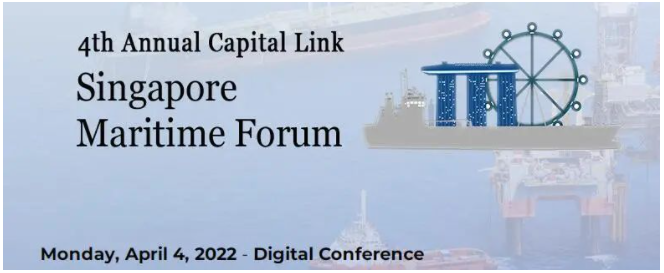
The 4th Annual Capital Link Singapore Maritime Forum was successfully conducted digitally in partnership with Columbia Shipmanagement and Singhai Marine Services, and in conjunction with Singapore Maritime Week on 4 Apr 2022. The forum featured industry leaders from Singapore on the various panels sharing their insight on issues specific to the Singapore Maritime Community/Cluster as well as on critical global industry topics. Our Group MD, Mr. Terence Zhao Wei, was invited to be the Moderator for one of the hottest topic of discussion which concerns every stakeholder in the shipping industry i.e., “Seafarer Crewing Strategies for Shipping Companies as Geopolitical Tension and Economic Uncertainties Intensify”.
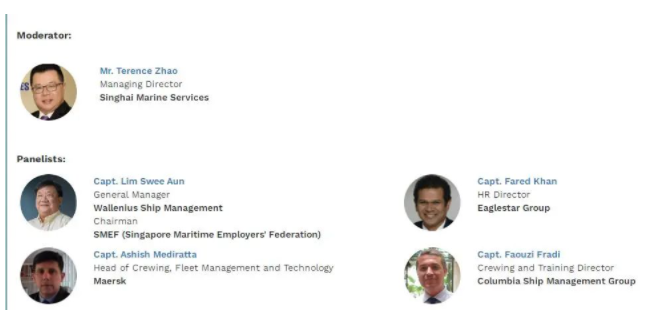
With him in the panel were Capt. Fared Khan, HR Director of Eaglestar Group, Capt. Ashish Mediratta, Head of Crewing, Fleet Management and Technology at Maersk, Capt. Lim Swee Aun, General Manager of Wallenius Ship Management and Chairman of Singapore Maritime Employers' Federation and Capt. Faouzi Fradi, Crewing and Training Director of Columbia Ship Management Group.
Mr. Terence Zhao Wei kicked off this panel discussion by welcoming all panelists and highlighting the headwinds currently facing the shipping industry due to supply chain and logistical disruptions brought about by the pandemic and the geopolitical risks and economic uncertainties created by the Russia-Ukraine conflict. Mr. Terence Zhao Wei reiterated that quality crew is required to operate vessels safely and efficiently. He was very happy to have a panel of experts from various segments of shipping companies to share how they manage their fleet during this period of economic uncertainty. With that, Mr. Terence Zhao Wei invited the experts to share on the nationality composition of their crew and the current concerns and challenges regarding the employment of Russian and Ukrainian seafarers in particular.
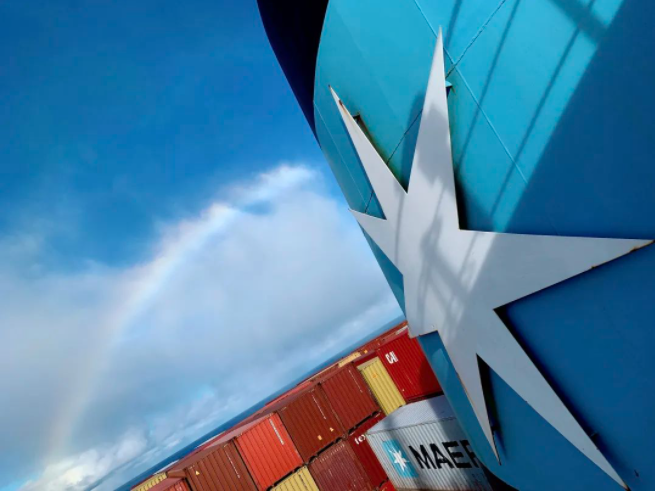
Capt. Ashish Mediratta, Head of Crewing, Fleet Management and Technology from Maersk started his sharing by stating that Maersk currently operates more than 300 vessels with more than 12,500 seafarers from different countries across various continents with the majority from India. Other nationalities include German, Danish, Ukrainian, Romanian, South African, Pilipino, Chinese and Indonesian. Capt. Ashish Mediratta highlighted that although the challenges of managing COVID has been reduced, Maersk still have to navigate the myriad of COVID safety measures implemented by different countries while flying their seafarers from point A to point B. Capt. Ashish Mediratta reiterated that his main concern is to be able to get seafarers return home on time upon completion of their contract. With only a very small percentage of seafarers who have completed their contract but yet to return home, he is of the opinion that the situation is manageable. Regarding the impact of the Russia-Ukraine conflict, Capt. Ashish Mediratta said that there is definitely a possible negative impact as Maersk employs about 500 Ukrainian and 70 Russian. The company is working out various strategies to mitigate any possible negative impact.

The next panelist, Capt. Fared Khan, HR Director of Eaglestar Group, said that Eaglestar deploys seafarers from over 30 countries, focusing on energy transportation from LNG to VLEC. He agreed with Capt. Ashish Mediratta that diversity is a common strategy that ship owners and ship managers use to operate their vessels safely. This diversity is something we need to look at from risk perspective and manage it. Even though incidences of COVID contraction is subsiding, the biggest challenge remains the mental wellness of seafarers. He highlighted that during Covid, many seafarers are reluctant to re-join ship and a huge number are taking extended leave. Capt. Fared Khan highlighted that restoring the mental wellness of seafarers so that they can revert to accepting normal rotation despite COVID complications, the logistic nightmare, and the Russia-Ukraine conflict, is the greatest challenges he is facing. He reiterated that we need to look at how to move forward as an industry and from a macro level. In light of the challenges we face today, there is a need to modernize how a shipping company recruits, build up its talent pool, address pre and post recruitment and management matters and heighten the visibility of seafaring careers in order to enjoy sustainable growth. With regard about the matrix compliances, Capt. Fared Khan mentioned that current limitations making the compliances more challenging. He shared that Eaglestar is looking at cross-skilling of their existing seafarers from conventional oil to gas and ethane fleets. Capt. Fared Khan reiterated that re-skilling of existing seafarers is the better way to manage the matrix compliance as well as to retain and circulate in-house talents within Eaglestar fleet. Eaglestar’s strategy is to look at their seafarers as universal seafarers, a holistic talent pool rather than segmentation of seafarers.
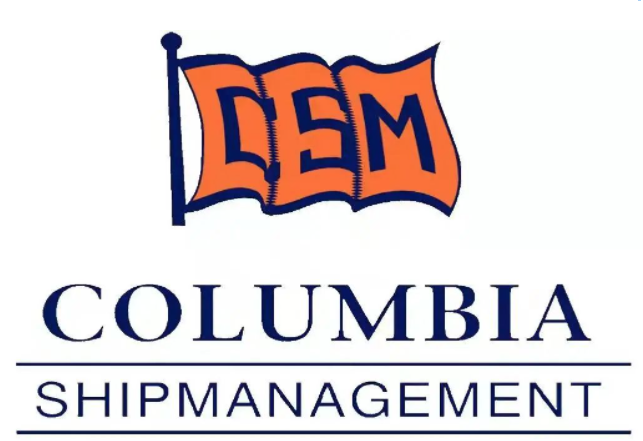
Capt. Faouzi Fradi, Crewing and Training Director of Columbia Ship Management Group started his sharing by mentioning that Columbia manages more than 400 vessels of different types and sizes and more than 14,000 seafarers from different nationalities. He pointed out that nationality diversity provide Columbia with greater employment and deployment flexibility especially during time of crisis. Capt. Faouzi Fradi mentioned that Columbia employs a large number of Pilipino, with the majority being ratings, and a large number of officers from Eastern Europe such as Russian, Ukrainian, Romanian, and Georgian etc. He highlighted that diversity of seafarers has helped Columbia deal with the fluid COVID situations such as changes to regulations, restrictions on certain nationalities and restrictions in some airports. Capt. Faouzi Fradi commended the Pilipino seafarers’ resilience; they are always able to join ships as scheduled and he hope that this situation will remain the same if not improve. He highlighted that the Russian-Ukraine conflict has triggered another potential challenge as Columbia employs thousands of Russian and Ukrainian seafarers with the majority being officers. Fortunately, these Russian and Ukrainian seafarers are behaving professionally while working together onboard the same vessels and there is no significant conflict reported so far. The big challenge from this development is the imposition of martial law by Ukraine which prohibits any male between 18 to 60 years old from leaving the country. This restriction will pose a great challenge in the near future if the conflict persists. In response to Mr. Terence Zhao Wei’s queries on how Columbia manage Russian and Ukrainian seafarers working on board the same vessel, how Columbia repatriates Ukrainian seafarers and how Columbia pay their Russian seafarers, Capt. Faouzi Fradi highlighted that Columbia has done many proactive measures such as encouraging their crew not to discuss the war through their CEO’s weekly video messages, counseling the crew and engaging the ship Masters through frequent meetings to discuss how can seafarers live together professionally. He hopes that the war will not last too long before maintaining the present good working relationship on board becomes challenging. With regard to the repatriation of Ukrainians, Capt. Faouzi Fradi mentioned that the P & I Club, unions and different organizations have provided solutions on how to handle Ukrainian repatriation. These solutions have proved helpful to Columbia when dealing with the repatriation of Ukrainians. He mentioned that most of the Ukrainian seafarers decided to repatriate to other countries either because their family members are there or to avoid returning to Ukraine for other reasons. Capt. Faouzi Fradi highlighted that Columbia has set up centres in countries near Ukraine such as Poland and Romania to provide assistance, accommodation and transportation to repatriate Ukrainian seafarers and their families. He also highlighted that Columbia has set up a relief fund and sanctuary catering exclusively to family members of their Ukrainian seafarers. With regard to the salary payment of Russian seafarers, Capt. Faouzi Fradi mentioned that Columbia recommends to their Russian seafarers to open bank account with banks currently not being sanctioned. In this way, Colombia is still able to continue remunerating Russian seafarers monthly without any problem.
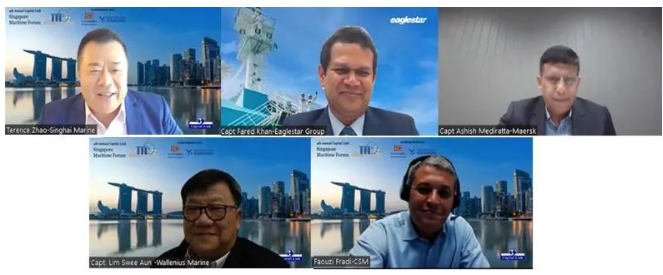
Capt. Lim Swee Aun, General Manager of Wallenius Ship Management and Chairman of Singapore Maritime Employers' Federation started his sharing by mentioning that Wallenius employs 650 seafarers and operates 21 car carriers. 65% of their seafarers are Pilipino and the remaining 35% consists of seafarers from Myanmar, Sweden, Singapore and Malaysia. He highlighted that all their vessels are plying different routes globally, ranging from Japan to Australia, the Atlantic and Pacific oceans. Capt. Lim Swee Aun stated that although the Russia- Ukarine war have no direct impact on Wallenius currently since they do not employ Russian and Ukrainian seafarers, Wallenius is nevertheless concerned that the conflict might result in a shortage of seafarers forcing shipping companies to poach and drive up wages. While this situation has not occurred, his company has started contingency planning to source for alternative supply of seafarers and consider what other areas the company should venture into if this situation arises. Capt. Lim Swee Aun mentioned that although COVID restrictions in many countries have been reviewed, China has not done so. He highlighted that Wallenius has new buildings in China and the company had encountered problems sending their seafarers into China to man their vessels. As such, they had no choice but to employ Chinese seafarers to do the delivery. The current salary of Chinese seafarers is relatively high as compared with other nationalities. To lower cost, Chinese seafarers are employed on short contracts for delivery of new buildings and they will do a crew change at the next available port once outside China. Capt. Lim Swee Aun suggested that since Singhai Marine Services is providing Chinese seafarers, Singhai could discuss with shipping companies with new buildings in China to provide a more viable solution. In response, Mr. Terence Zhao Wei asked Capt. Lim Swee Aun to approach him if he encounters problems and Singhai will definitely help to deliver their new buildings out of China. He informed the panel that he will share his observation about Chinese seafarers after the main discussion.
Mr. Terence Zhao Wei then highlighted that some shipping segments are doing better than others. For example, the container segment has made good profit while tankers are suffering these few years. Wage increases due to crew shortages had occurred for all nationalities and not just for Chinese seafarers. Repatriation cost during the COVID pandemic had also significantly exceeded the crew change budget of most shipping companies. He invited Capt. Fared Khan and Capt. Ashish Mediratta to share how they manage their crewing cost during COVID and moving forward, whether they foresee salary of seafarers will continue to rise because of the crew shortage resulting from the Russian-Ukraine conflict.
In response, Capt. Fared Khan firmly believe that the current situation is a business risk that every good business should address. The industry would have to manage events such as the pandemic and the conflict. He highlighted that transportation cost was high at the beginning of the pandemic because companies need to charter flights for overdue crew changes. Though the cost was extremely high, it was necessary so as to bring back some form of normalcy on board. Capt. Fared Khan reiterated that business cost needed to be respond accordingly as conditions change. The pandemic has increased crew change cost in terms of transportation, logistic and the numerous PCR tests (ranging from USD 50 to USD 500 per test) required. As ship managers, it is up to us to work with ship owners, masters, agents and stakeholders across the full logistic spectrum to see how best we can manage it. He mentioned that air transportation is returning to some form of normality. Countries are opening up and the resultant decrease in air ticket prices has helped companies manage cost. Capt. Fared Khan pointed out that the reduction in the number of seafarers returning to sea definitely has a great impact on crew cost. One has to clear that despite the bumper harvest container ships are currently enjoying, unbridled one-off bonuses and wage increases is not a sustainable way to move forward. He mentioned the energy sector is feeling the pain even keener. Nevertheless, Capt. Fared Khan reiterated that the solution is to retain long-serving and loyal crew by ensuring that they can see a sustainable future with the company. He concluded that while there will be increases in crew management cost, logistical cost and wages, a good company will need to manage these and move forward.
Capt. Ashish Mediratta agreed with Capt Fared Khan that crew management cost is part and parcel of business and that we need to support and manage it. He mentioned that in business, there are always ups and downs. For the container market, Maersk’s business is sustainable because of current high freight rate and it has accorded more leeway for the company. Nevertheless, Maersk’s crew management cost has also been negatively impacted by factors beyond their control such as flights reduction, PCR test fees and multiple testing etc. Capt. Ashish Mediratta reiterated that during the pandemic, the important matter is how many seafarers they could send home on time. Their success rate in this matter will likely translate proportionally to the number of seafarers returning back to ship on time. If seafarers spend extended time on board, they will likely extend their leave proportionally. This could trigger crew deficiency and it is quite impossible to poach crew since the whole industry is facing the same challenge.
Capt. Ashish Mediratta mentioned that he is happy to see shipping companies pulling together as a whole and the industry was focusing on how to look after their seafarers during the pandemic. With regard to the Russian-Ukraine war, Capt. Ashish Mediratta cautioned that we need not overreact as there actually are a reasonable number of Ukrainian seafarers rejoining ships. He suggested that instead of overreacting, we should be patient and see how the war evolves in three to four months’ time and how soon we can get the Ukrainian seafarers back. Capt. Ashish Mediratta pointed out with the need for and demands of technology, we need more competent seafarers in the shipping industry. However, the sourcing of talented seafarers is challenging and the industry should work together to address this challenge before it becomes critical. He shared that Maersk, as with other shipping companies, is looking at employing female seafarers to increase the pool and provide flexibility and diversity at sea. He concluded that while cost is a constant pain point, it needs to be managed from a long term perspective.
In response to Mr. Terence Zhao Wei’s question on the crewing salary trend, Capt. Ashish Mediratta is of the opinion that the industry would have to accept that salary will increase in tandem with inflation. The question is what level the salary will increase to? He mentioned that companies should start to look at alternate sources of crew by venturing into other Southeast Asia countries to develop a pool there rather than limit themselves to the traditional few countries. Capt. Ashish Mediratta was confident that new sourcing areas can help in managing the cost. He mentioned that it is important to broaden the horizon. COVID has shown that companies with crew of different nationalities have been able to manage better than those with crew from a single source. Capt. Ashish Mediratta feels that the expansion to new sourcing areas will help control cost. He mentioned that although container is doing well today but there is no certainty that the bumper harvest would continue for the next 10 years. Therefore, the industry needs to be mindful and develop long-term solutions that are good for the industry.
In response to Mr. Terence Zhao Wei’s question on the human capital planning required in anticipation of shortage of seafarers should the Russia-Ukraine conflict drags on, Capt. Ashish Mediratta pointed out that we need to be mindful while the number of Russian and Ukrainian seafarers may have been reduced, trade with these 2 countries might have been be reduced as well. The reduction of trade might reduce the number of vessels required at sea and in turn, lower the demand of seafarers correspondingly.
Capt Fared Khan added that with good risk management, companies can adopt right strategies to manage the geo-political issues and pandemic. He shared Eaglestar past strategy of spreading the risk by not focusing on one nationality or one area. In addition, Capt Fared Khan highlighted that Eaglestar is not only spreading risk through nationality diversity but also spreading risk through cross skilling. The concept of universal seafarers allows Eaglestar to have the flexibility to cross deploy them on board oil tanker, gas tanker or ethane carrier. He mentioned that Eaglestar is fortunate to have their own training centre. Malaysian Maritime Academy (ALAM) has been very successful in cross skilling their seafarers thus enhancing their capability and ability to transfer their seafarers to different vessels. Capt Fared Khan firmly believe that cross skilling is going to be the future trend with modernization and technology moving quickly. He mentioned that a lot of shipping companies and maritime training centres are looking at cross skilling of seafarers and diversifying the skills of seafarers such that the crew can be and utilized fleet-wide, at any time you need them and to be at the right place at the right time.
In response to Mr. Terence Zhao Wei’s question on how Columbia Ship Management manages their multi-national seafarers, Capt. Faouzi Fradi reiterated that their ability to retain their crew is an extremely important factor during crisis, especially since they cannot control competing wage offers. He mentioned that the ability to retain can be built over a period of time by giving the seafarers a sense of ownership and belonging and ensuring seafarers’ voices are heard at all times. Capt. Faouzi Fradi mentioned that Columbia provides a lot of opportunities for seafarers to communicate with the company and at Columbia, every seafarer has the CEO’s mobile number, an uncommon practice in shipping and other industries. He highlighted that Columbia’s crew has no hesitation sharing their thoughts, their concerns and any complaint about the company through an open reporting system comprising hotlines and direct calls to any of the management team. With regard to welfare, Capt. Faouzi Fradi highlighted that Columbia had offered mental health support to their seafarers on a 24/7 basis even before COVID started. He further highlighted other initiatives Columbia is currently practicing. These include free internet access to keep the seafarers happy and well-trained chefs onboard to provide healthy and diverse meals that respect the cultures of seafarers on board. Capt. Faouzi Fradi believes that the best way to retain crew is to keep the crew engaged. He mentioned that Columbia had hosted webinars on diverse topics catering to the interest of different crew, organizing competition, providing new fitness equipment onboard and providing crew training opportunities which is an extremely important form of welfare to help seafarers forward their careers. Capt. Faouzi Fradi shared that Columbia has an E-Learning Management System with 15,000 subscribers even before COVID started. The Learning Management System has comprehensive learning material consisting of some mandatory training as well as free open sources learning and education material. In conclusion, Capt. Faouzi Fradi stressed that Columbia’s management of seafarers is a total package, centered on the crew.
In response to Mr. Terence Zhao Wei’s queries on new development in Singapore, Capt. Lim Swee Aun mentioned that the Singapore Maritime Employers' Federation has been working with unions and the Maritime and Port Authority of Singapore on how to improve the maritime industry in Singapore. He has noticed in the last 2 years that most ship owners and managers are doing their best to improve the welfare of their crew by engaging seafarers through VC platform allowing for time zone differences to ensure all seafarers are receiving the same information. Capt. Lim Swee Aun pointed out that ship owners and managers are currently acting unilaterally to provide training and welfare. He suggested that if ship owners and managers can be brought together to discuss and share best practices before implementing them, it will improve the overall outcome, be it for training or welfare. Capt. Lim Swee Aun further suggested that it is important that our industry aims not only to improve conditions on their own vessels but also condition in the whole industry. Going forward, Capt. Lim Swee Aun pointed out that maybe the Maritime and Port Authority of Singapore and the unions can organize more meeting and discussion for ship owners and managers to share the best practices in training, improvement of health and welfare of seafarers. He mentioned that this is one key point he will bring up during the next meeting with the Maritime and Port Authority of Singapore and the unions.
Capt. Lim Swee Aun mentioned that Singapore is trying to reduce the restrictions for crew change though the number of seafarers coming to Singapore for crew change is presently not as high as that in other countries. He highlighted that Singapore stakeholders have yet to reach common ground on required testing before allowing seafarers to join ship in Singapore. The Singapore Maritime Employers' Federation will continue to discuss with the Maritime and Port Authority of Singapore and maybe Ministry of Health to resolve the issue in the near future.
Before concluding, Mr. Terence Zhao Wei shared his observation on the crewing situation in China. He pointed out that due to China’s zero Covid policy, foreign crew cannot fly into China and also cannot sign off in China. On the other hand, China has a big number of seafarers, but many Chinese crew fear the COVID situation outside China and are reluctant to join ocean going ships. At the same time, many foreign ship owners have to employ Chinese crew to deliver their ships built in China. This has reduced supply on one hand and increase demand on the other resulting in a severe shortage of Chinese crew particularly in 2021 which in turn, is driving the cost of Chinese crewing to its highest in history. Mr. Terence Zhao Wei highlighted that, the situation has been improving since March 2022, with Chinese crew’s salary expectation subsiding to more realistic levels as the COVID situation has improved worldwide, ship owners having more options for crewing their vessels and more Chinese seafarers are available and willing to join ocean going ships. He is of the opinion that the demand and supply for Chinese seafarers crew is moving towards a competitive and sustainable equilibrium. Mr. Terence Zhao Wei predicts that although China will still maintain its zero COVID for the present, it very unlikely this policy will last for long given the fact that most countries are opening up. He wishes for restriction in China be eased in the near future. In the post pandemic period, Mr. Terence Zhao Wei personally believes that Chinese crew will remain employable and competitive while the global shortage of quality seafarers, especially officers, remains the biggest challenge for the industry both in short term and long term.
In conclusion, Mr. Terence Zhao Wei expressed his appreciation to the panelists for taking time to share their views on the current crewing situation on their vessels, the challenges they are facing and how they manage the crew despite their busy routine. He reiterated that crewing is always very challenging. But by hearing from each other, sharing information, practicing good ethics and constantly engagement with regulators to improve crewing practices, Mr. Terence Zhao Wei is confident that the industry can overcome the difficulties it is facing now. He expressed that the sharing session has been insightful and he personally has many takeaways from the panel discussion. Mr. Terence Zhao Wei hopes that the audiences participating in this digital conference have many takeaways too. Finally, Mr. Terence Zhao Wei thanked everyone for their time and participation in today’s discussion. He wishes everyone good luck and stay safe.
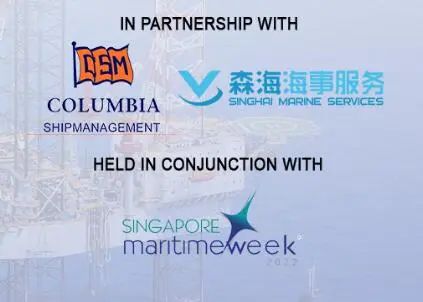
|

